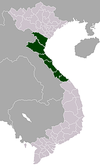Cồn Cỏ District
Cồn Cỏ District
Huyện đảo Cồn Cỏ | |
|---|---|
| Cồn Cỏ Island District | |
 Seal | |
| Country | |
| Region | North Central Coast |
| Province | Quảng Trị |
| Capital | Dảo Cồn Cỏ |
| Area | |
| • Total | 0.8 sq mi (2 km2) |
| Population (2003) | |
| • Total | 400 |
| Time zone | UTC+07:00 (ICt) |
Cồn Cỏ (![]() listen) (also known as Tiger Island) is a rural district of Quảng Trị Province in the North Central Coast region of Vietnam. It is an island and is located 27 km to the east of Mũi Lay.
listen) (also known as Tiger Island) is a rural district of Quảng Trị Province in the North Central Coast region of Vietnam. It is an island and is located 27 km to the east of Mũi Lay.
Con Co Island has an area of 2.3 km2 (0.89 sq mi), the isometric form of hills, the highest peak of 63m. This is a young volcanic island, composed of basalt and basalt tuff stones of Neogene – Quaternary age [1].
Before it became its own district, the island was in the commune of Vĩnh Quang, in Vĩnh Linh District of Quảng Trị Province. The island became a district through Decree 174/2004 NĐ-CP of October 1, 2004. Province officials held a ceremony to create the district on April 18, 2005.
As of 2003 the district had a population of 400.[1] The district covers an area of 2 km², making one of the smallest districts in Vietnam. The district capital lies at .[1]
History[]
According to recent archaeological work, in the Bến Nghè area of the island, there are rock artefacts believed to date to the Stone Age, tens of thousands of years ago. In the first few centuries CE, Cham people inhabited the island.
Excavations undertaken in 1994 show that during the 17th and 18th centuries, the island was a stopover point for Vietnamese sea merchants.
During the time of the Nguyễn Dynasty, the island was used to imprison convicts, and some objects such as chains and metal clasps have been found there.
Vietnam War[]
Due to its proximity to the Vietnamese Demilitarized Zone, during the Vietnam War, Tiger Island was used as a base for North Vietnamese military forces.[2]
On 14 March 1965 the island was attacked by Republic of Vietnam Air Force A-1 Skyraiders.[2]
On 27 June 1972, North Vietnamese coastal artillery on Tiger Island fired on US warships, including USS Blue Ridge, supporting a landing of South Vietnamese Marines near the Cửa Việt River .[3]
References[]
- ^ Jump up to: a b "Districts of Vietnam". Statoids. Retrieved March 20, 2009.
- ^ Jump up to: a b Kelley, Michael (2002). Where we were in Vietnam. Hellgate Press. pp. 5–513. ISBN 978-1555716257.
- ^ "Blue Ridge III (LCC-19)". Naval History and Heritage Command. Retrieved 27 September 2016.
- Districts of Quảng Trị Province
- Islands of Vietnam
- Landforms of Quảng Trị Province
- North Central Coast geography stubs

